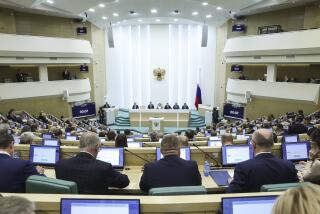Lawmakers in Russia Reject Yeltsin ‘Truce’ : Politics: Supreme Soviet also calls for investigation into whether president has violated the constitution.
- Share via
MOSCOW — Russian legislators set the stage Friday for a new confrontation with President Boris N. Yeltsin by voting down his proposed “political truce” and calling the Congress of People’s Deputies, or Parliament, into session next week to investigate whether he violated the constitution.
The decisions by the Supreme Soviet--Russia’s standing legislature, many of whose members also sit in Parliament--capped a week of rising political temperatures in frigid Moscow, a veiled threat by Yeltsin to dissolve both lawmaking bodies and rumors of military intervention in an increasingly paralyzed political system.
In a sign of the tension spreading through official Moscow, Parliament Speaker Ruslan I. Khasbulatov instructed parliamentary guards to tighten security at the Grand Kremlin Palace to prevent “terrorist acts” or “illegal measures” at next Wednesday’s opening Congress session.
“I’ve asked the guards to give me a gas pistol to defend myself,” said Iona Andronov, an independent deputy. “We have to prepare our retreat from the Kremlin because at this point anything can happen.”
The last time Congress met, in early December, fistfights erupted in the hall and Yeltsin lost a politically bruising battle with its conservative majority to keep a radical economic reformer, Yegor T. Gaidar, as his acting prime minister. This time it is the 62-year-old president who will be on the firing line.
After a winter of frustration, Yeltsin himself first called for the Congress session, hoping to win approval of his proposed truce. It would have obliged him and lawmakers to stop raiding each other’s spheres of activity until a new constitution could clearly define their powers.
Specifically, Yeltsin wanted Congress to give up control of the Central Bank, the Pension Fund and the State Property Fund--agencies that have undermined his tight fiscal policies with inflationary public spending.
On Friday, Khasbulatov branded Yeltsin’s proposal an unacceptable “ultimatum.”
The Supreme Soviet, which, among other items, had been considering the issue of power-sharing in the Russian government, argued Friday that it had no authority to tinker with the balance of power; lawmakers, thus, rejected the Yeltsin truce by a vote of 157 to 4.
Then they put their own item on the Congress agenda--ordering a report by Russia’s Constitutional Court on “obedience to the Constitution by the highest organs of state power.” The court has overruled Yeltsin, as well as lawmakers, in the half a dozen constitutional cases it has decided.
Anti-Yeltsin forces suggested they might use the report to try to impeach the president; that is a move they failed to put on the agenda in December.
“The president doesn’t have any choice,” said Ilya Konstantinov, a leader of the hard-line Russia Unity bloc. “He will either face charges for what he has done or try to seize absolute power.”
Bracing for conflict, Yeltsin has been lobbying this week for support among former enemies. In an interview with Pravda, his first since briefly closing the pro-Communist paper in 1991, he said Communists “should be treated with respect, as any other political party. And we should work with them.”
But later he caused a backlash by declaring himself free of any allegiance to the constitution, which he said had been amended beyond recognition since he took office two years ago. He also said he was preparing a “final option” for dealing with lawmakers if they avoided compromise--a hint that he would usurp power and rule unconstitutionally by decree.
Khasbulatov, who chairs both the Supreme Soviet and the Congress, reacted angrily. He said Friday that “the basis for cooperation is dramatically narrowing” because of Yeltsin’s “extremely aggressive behavior.”
Then, in an attempt to create the appearance of military support, Yeltsin summoned a reporter from Izvestia, a sympathetic newspaper, to hear him address army commanders. It reported that the generals demanded Yeltsin take “resolute measures” to end the crisis.
As Moscow buzzed with speculation about where exactly the army stands, Yeltsin rejected an invitation to appear Friday in the Supreme Soviet and explain what he and the generals had discussed.
Former President Mikhail S. Gorbachev told reporters that neither the people nor the army would support Yeltsin if he violated the constitution.
More to Read
Sign up for Essential California
The most important California stories and recommendations in your inbox every morning.
You may occasionally receive promotional content from the Los Angeles Times.













